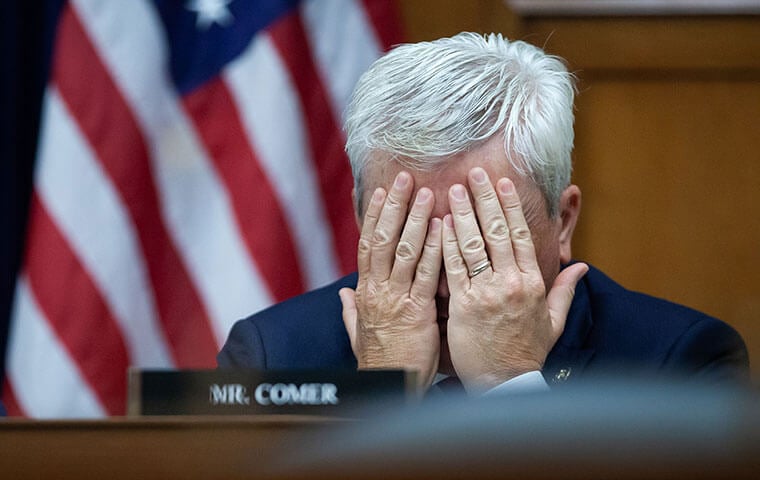 Rep. James Comer )R-KY) puts his face in his hands during a hearing featuring testimony by former New York Governor Andrew Cuomo (D) testifies about his state's response to coronavirus in nursing homes in Washington, USA, on September 10, 2024. Image: Allison Bailey/NurPhoto/Shutterstock
By: FEDweek Staff
Rep. James Comer )R-KY) puts his face in his hands during a hearing featuring testimony by former New York Governor Andrew Cuomo (D) testifies about his state's response to coronavirus in nursing homes in Washington, USA, on September 10, 2024. Image: Allison Bailey/NurPhoto/Shutterstock
By: FEDweek StaffA bill (HR-479) to have federal employees telework like it’s 2019 has been reintroduced, and like its predecessor in the prior Congress is likely to get early attention in the House.
The bill, whose formal title which creates the acronym SHOW UP, was again offered by Oversight Committee chairman Rep. James Comer, R-Ky., who said that the continued elevated levels of federal telework post-pandemic “has harmed the fulfillment of agency missions and the delivery of critical services to the American people, while hiking taxpayer costs as federal buildings sit empty in the Washington, D.C. area.”
The bill would require agencies to reduce telework to not more than 2019 levels within 30 days and report to Congress within six months on how telework levels since then have affected their services, network security, and costs for real property and locality pay.
Agencies could only expand telework from those levels by submitting to Congress plans certified by OPM that detail how an expansion would “substantially improve agency mission-performance; substantially lower agency costs for real property and locality pay; ensure security for agency networks, data and records; and accelerate the dispersal of federal jobs across the nation and outside the Beltway.”
Its introduction follows the committee’s first hearing of the year at which Republicans repeated criticisms of telework as degrading customer service and leading to wasteful spending on underused facilities. The committee’s majority meanwhile released a report that made those same arguments and also criticized the Biden administration for inability to even quantify telework until a congressionally mandated report from OMB last fall.
While that report showed that above half of federal employees never telework and that those who do are onsite on average three days a week, it did not substantially address the impact on productivity—even though the law called for such an assessment. The GAO recently reported that because budgets and other factors affect customer service and other agency operations, telework’s impact is hard to gauge—and that three of the four agencies it examined had done little to even try.
At the hearing, much of the focus was on the SSA’s decision in late 2024 to extend for another five years a contract with the AFGE union guaranteeing certain rates of telework to field office employees, among others. While former SSA commissioner Martin O’Malley defended it as improving service and producing savings, several Republicans decried it as a move to block the Trump administration from cutting back telework there.
The SHOW UP bill is silent regarding the conflict between its mandate to revert to pre-pandemic telework practices and contracts with such clauses—which are common across agencies and which unions have said they will defend through legal action.
Meanwhile, Sen. Jim Lankford, R-Okla., who is in line to take over the Senate Governmental Affairs subcommittee overseeing the federal workforce, has reintroduced a bill (S-82) to require more detailed reporting by OPM on offsite work by agency; require more training on rules of offsite working; and require annual reviews of whether an employee’s telework should continue, taking into account their performance and the needs of the agency.
Those bills join several others already introduced in the new Congress. The House in the prior Congress promptly passed Comer’s bill in early 2023 but it got no attention in the Senate. The Senate committee passed Lankford’s bill last spring but it did not get a floor vote.
Shutdown Meter Ticking Up a Bit
Judge Backs Suit against Firings of Probationers, but Won’t Order Reinstatements
Focus Turns to Senate on Effort to Block Trump Order against Unions
TSP Adds Detail to Upcoming Roth Conversion Feature
White House to Issue Rules on RIF, Disciplinary Policy Changes
Hill Dems Question OPM on PSHB Program After IG Slams Readiness
See also,
How Do Age and Years of Service Impact My Federal Retirement
The Best Ages for Federal Employees to Retire

